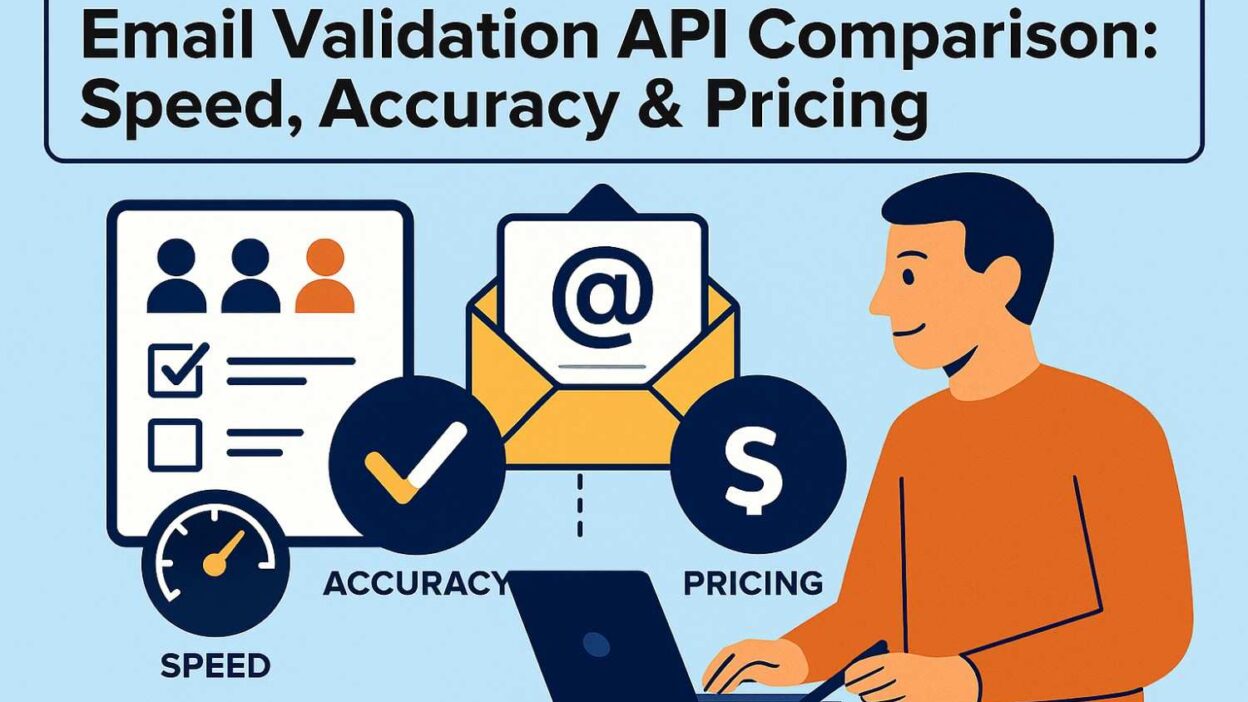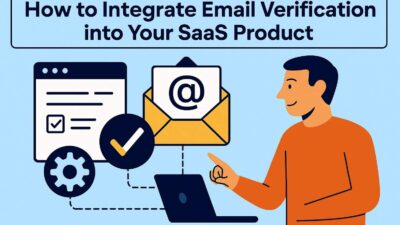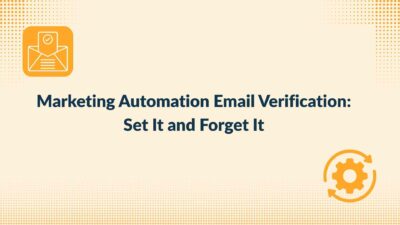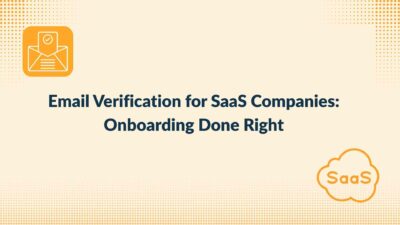Choosing the right email validation API can make or break your marketing campaigns, customer onboarding processes, and overall data quality strategy. With dozens of providers claiming superior accuracy and competitive pricing, making an informed decision requires deep analysis of performance metrics, feature sets, and real-world implementation costs.
This comprehensive comparison examines the leading email validation APIs across three critical dimensions: speed, accuracy, and pricing. We’ll analyze how each service performs under different conditions, their unique strengths and limitations, and provide actionable insights to help you select the optimal solution for your specific requirements.
Table of Contents
Understanding Email Validation API Performance Metrics
Email validation effectiveness depends on multiple factors that extend beyond simple valid/invalid classifications. Modern businesses require sophisticated validation that considers deliverability probability, engagement potential, and risk assessment—all delivered within acceptable time frames and budget constraints.
Speed Performance Indicators
Response time directly impacts user experience and application performance. Email validation APIs typically process single requests within 200-2000 milliseconds, but this varies significantly based on validation depth and service architecture. Real-time form validation requires sub-second responses to maintain smooth user interactions, while batch processing can tolerate longer response times in exchange for higher accuracy.
Throughput capacity becomes crucial for high-volume applications. Some services excel at handling thousands of concurrent requests, while others optimize for individual request speed. Understanding your peak usage patterns helps identify services that align with your operational requirements without causing bottlenecks or user experience degradation.
Network geography also affects performance, with some providers offering global infrastructure that reduces latency for international applications. Content delivery networks and regional API endpoints can significantly improve response times for geographically distributed user bases.
Accuracy Assessment Framework
Email validation accuracy encompasses multiple validation layers, each contributing to overall effectiveness. Syntax validation catches obvious formatting errors but provides limited insight into actual deliverability. Domain verification confirms that receiving servers exist and can accept messages, while mailbox verification tests whether specific addresses can receive emails.
Advanced accuracy features include spam trap detection, which identifies honeypot addresses used by anti-spam organizations to catch bulk senders. Role address identification flags generic addresses like info@ or support@ that typically generate lower engagement rates. Disposable email detection prevents temporary addresses from entering your database, improving long-term list quality.
Confidence scoring provides nuanced assessment beyond binary valid/invalid classifications. Services that offer percentage-based confidence levels enable sophisticated segmentation strategies and risk-based decision making that optimizes campaign performance while protecting sender reputation.
Pricing Structure Analysis
Email validation pricing models vary dramatically across providers, making direct comparison challenging without understanding your specific usage patterns. Per-verification pricing typically ranges from $0.0005 to $0.005 per email, with volume discounts available for high-usage customers.
Monthly subscription models offer predictable costs for consistent usage patterns, often including generous free tiers that support small businesses and development projects. Enterprise pricing typically includes dedicated infrastructure, custom SLAs, and advanced features that justify premium costs for mission-critical applications.
Hidden costs can significantly impact total ownership expenses. API rate limits, overage charges, premium feature fees, and setup costs should be carefully evaluated when comparing total cost of ownership across different providers.
Leading Email Validation API Providers
Hunter.io Email Verifier
Hunter.io has established itself as a premier email validation provider, particularly strong in B2B applications where company email detection and professional address validation are crucial. The service combines real-time verification with comprehensive domain analysis and detailed confidence scoring.
Speed Performance:
Hunter.io typically delivers verification results within 300-800 milliseconds for standard requests, making it suitable for real-time form validation and user registration workflows. The service handles batch processing efficiently, supporting up to 10,000 emails per batch with results delivered via webhook or polling mechanisms.
Their global infrastructure includes multiple data centers that optimize response times for different geographic regions. API response times remain consistent during peak usage periods, indicating robust infrastructure scaling capabilities that maintain performance under load.
Accuracy Capabilities:
The platform excels at identifying professional email addresses and distinguishing between personal and business emails. Hunter.io’s domain reputation analysis provides insights into email deliverability probability based on historical sending patterns and recipient engagement data.
Their SMTP verification includes catch-all detection, which identifies domains that accept all incoming emails regardless of specific mailbox existence. This feature prevents false positives that could waste marketing resources on non-existent addresses that appear valid during basic verification.
Spam trap detection leverages Hunter.io’s extensive database of known honeypot addresses accumulated through their email finding services. This cross-platform intelligence provides superior protection against reputation-damaging addresses compared to providers without similar data sources.
Pricing Structure:
Hunter.io offers a freemium model with 25 free verifications monthly, supporting small businesses and testing scenarios. Paid plans start at $49 monthly for 1,000 verifications, scaling to enterprise pricing for high-volume requirements.
The pricing includes access to their email finder service, providing additional value for sales and marketing teams seeking to identify decision-maker contact information. Volume discounts become available for customers requiring more than 10,000 monthly verifications, with custom pricing for enterprise accounts.
ZeroBounce Email Validation
ZeroBounce focuses heavily on deliverability optimization and inbox placement, making it popular among email marketers prioritizing campaign performance over simple validation. The service provides detailed email scoring and risk assessment that helps optimize sending strategies.
Speed Performance:
ZeroBounce typically processes verification requests within 400-1200 milliseconds, depending on the depth of validation requested. Their API supports both synchronous and asynchronous processing, allowing applications to choose between immediate results and more thorough verification that takes additional time.
Batch processing capabilities handle up to 100,000 emails per upload, with results available through dashboard download or webhook delivery. Processing times for large batches range from minutes to hours depending on list size and validation depth requirements.
Accuracy Capabilities:
The platform’s standout feature is its deliverability scoring, which predicts inbox placement probability based on recipient server configurations, historical bounce patterns, and engagement metrics. This scoring helps marketers segment lists for optimal campaign performance.
ZeroBounce’s abuse detection identifies email addresses associated with spam complaints, helping protect sender reputation by flagging potentially problematic recipients. Their geo-location data provides insights into recipient locations for compliance and targeting purposes.
The service includes detailed bounce classification that distinguishes between hard bounces (permanent failures) and soft bounces (temporary issues), enabling sophisticated list management strategies that preserve potentially viable addresses while removing confirmed invalid ones.
Pricing Structure:
ZeroBounce offers 100 free verifications monthly with no expiration, providing ongoing value for small-scale users. Paid plans begin at $16 monthly for 2,000 verifications, with significant volume discounts for larger requirements.
Their credit-based system allows unused verifications to roll over monthly, providing flexibility for variable usage patterns. Enterprise plans include dedicated IP addresses, priority processing, and custom integration support that justifies premium pricing for high-volume senders.
NeverBounce Email Verification
NeverBounce positions itself as a developer-friendly email validation service with robust API capabilities and comprehensive integration support. The platform emphasizes reliability and accuracy for mission-critical applications where email validation failures could impact business operations.
Speed Performance:
NeverBounce delivers verification results within 200-600 milliseconds for most requests, making it among the faster providers for real-time validation needs. Their API architecture supports high concurrency with rate limits that accommodate demanding applications without throttling.
The service offers both real-time verification for immediate results and bulk processing for large lists. Bulk verification includes progress tracking and partial result delivery, allowing applications to process results as they become available rather than waiting for complete batch completion.
Accuracy Capabilities:
NeverBounce’s verification engine performs comprehensive SMTP testing that includes connection timeouts and retry logic, ensuring accurate results even for servers with unusual configurations. Their catch-all detection is particularly sophisticated, using multiple verification techniques to determine actual deliverability for domains that accept all addresses.
The platform’s role account detection goes beyond simple pattern matching to analyze actual address usage patterns and engagement likelihood. This approach provides more nuanced classification than services relying solely on address format recognition.
Their spam trap database is continuously updated through partnerships with anti-spam organizations and ISPs, providing current protection against reputation-damaging addresses that might not be detected by other services.
Pricing Structure:
NeverBounce offers 1,000 free verifications for new accounts, providing substantial testing capacity for evaluation purposes. Paid plans start at $18 monthly for 5,000 verifications, with pay-as-you-go options for irregular usage patterns.
Volume pricing becomes increasingly attractive for high-usage customers, with enterprise plans offering dedicated support, custom SLAs, and white-label options. Their transparent pricing structure includes all features without premium tiers or hidden charges.
Mailboxlayer Email Validation
Mailboxlayer, part of the APILayer suite, provides straightforward email validation with emphasis on simplicity and reliable performance. The service targets developers seeking uncomplicated integration without extensive feature complexity.
Speed Performance:
Mailboxlayer typically responds within 300-900 milliseconds, providing adequate performance for most real-time applications. The service architecture prioritizes consistency over peak speed, maintaining stable response times during high-traffic periods.
Their API includes timeout configuration options that allow applications to balance speed requirements against validation thoroughness. Shorter timeouts provide faster results with potentially reduced accuracy, while longer timeouts enable more comprehensive verification.
Accuracy Capabilities:
The platform performs standard validation including syntax checking, domain verification, and SMTP testing. Mailboxlayer’s strength lies in reliable basic validation rather than advanced features like engagement prediction or detailed risk assessment.
Their disposable email detection covers major temporary email services and is regularly updated to catch new providers. Role address identification includes common patterns and can be customized for specific industry requirements.
Pricing Structure:
Mailboxlayer offers 250 free monthly verifications with straightforward paid plans starting at $9.99 monthly for 5,000 verifications. Their pricing structure is transparent without hidden fees or premium feature tiers.
The service provides good value for applications requiring basic validation without advanced analytics or sophisticated scoring. Volume discounts are available for higher usage tiers, making it cost-effective for medium-scale requirements.
EmailListVerify Service
EmailListVerify focuses on batch processing and list cleaning services, making it popular among email marketers managing large databases. The platform emphasizes accuracy and comprehensive reporting for detailed list analysis.
Speed Performance:
EmailListVerify optimizes for batch processing rather than real-time verification, typically processing large lists within hours rather than providing instant individual results. Their infrastructure handles millions of addresses efficiently with detailed progress reporting.
Real-time API responses range from 500-1500 milliseconds, adequate for applications where immediate results aren’t critical. The service offers priority processing for urgent verification requirements at premium pricing.
Accuracy Capabilities:
The platform excels at comprehensive list analysis, providing detailed reports on list composition, deliverability probability, and risk factors. Their verification includes sophisticated catch-all testing and detailed bounce prediction.
EmailListVerify’s reporting includes segment analysis that breaks down list quality by domain, country, and other criteria. This intelligence helps marketers understand list composition and optimize targeting strategies for better campaign performance.
Pricing Structure:
EmailListVerify offers competitive pricing for bulk verification, with rates decreasing significantly for larger volumes. Plans start at $4 for 1,000 verifications, making it among the most cost-effective options for high-volume users.
Their credit system never expires, providing flexibility for irregular usage patterns. Enterprise customers receive volume discounts and dedicated support that make the service attractive for large-scale email marketing operations.
Comparative Performance Analysis
Speed Comparison Across Use Cases
Real-time Form Validation:
For applications requiring immediate user feedback during email entry, NeverBounce and Hunter.io provide the most consistent sub-500ms response times. Mailboxlayer offers adequate performance for less demanding real-time scenarios, while ZeroBounce and EmailListVerify are better suited for asynchronous processing.
Batch Processing Efficiency:
EmailListVerify excels at processing large volumes quickly and cost-effectively, while ZeroBounce provides good batch performance with superior accuracy features. Hunter.io handles medium-sized batches efficiently, and NeverBounce offers flexible batch processing with real-time monitoring capabilities.
API Reliability:
All major providers maintain high uptime rates exceeding 99.5%, but NeverBounce and Hunter.io demonstrate the most consistent performance during peak usage periods. ZeroBounce occasionally experiences slower response times during high-demand periods, while smaller providers may have less robust infrastructure scaling.
Accuracy Comparison Framework
Basic Validation Accuracy:
Most providers achieve 95%+ accuracy for basic syntax and domain validation. Hunter.io and NeverBounce show superior performance for SMTP verification, while ZeroBounce excels at identifying deliverability issues that other services might miss.
Advanced Feature Accuracy:
ZeroBounce leads in deliverability scoring and abuse detection, providing insights that directly impact campaign performance. Hunter.io offers superior B2B email identification and professional address detection. NeverBounce provides the most reliable catch-all detection and role address identification.
False Positive Management:
NeverBounce demonstrates the lowest false positive rates, correctly identifying valid addresses that other services might flag as problematic. Hunter.io shows good performance for business emails but occasionally flags personal addresses incorrectly. ZeroBounce’s aggressive filtering sometimes creates false positives for legitimate addresses.
Pricing Value Analysis
Cost Per Verification:
EmailListVerify offers the lowest per-verification costs for high-volume users, while Mailboxlayer provides good value for medium-scale requirements. Hunter.io and NeverBounce justify premium pricing through superior accuracy and features, while ZeroBounce offers good value for deliverability-focused applications.
Total Cost of Ownership:
When including features, support, and reliability factors, Hunter.io and NeverBounce often provide better total value despite higher per-verification costs. Hidden costs like overage charges and premium features can significantly impact budget planning for all providers.
Scalability Economics:
All providers offer volume discounts, but the discount structures vary significantly. EmailListVerify provides the most aggressive volume pricing, while enterprise customers often find better value through custom contracts with Hunter.io or ZeroBounce.
Industry-Specific Considerations
E-commerce Email Validation
E-commerce applications require email validation that balances speed with accuracy to prevent cart abandonment while ensuring valid customer contact information. Real-time validation during checkout must complete within 300-500 milliseconds to avoid impacting conversion rates.
Hunter.io and NeverBounce provide optimal performance for e-commerce, offering fast response times with reliable accuracy for customer email validation. Their APIs integrate well with popular e-commerce platforms and support the high concurrency requirements of busy online stores.
Special considerations for e-commerce include validating international email formats, handling mobile-optimized checkout flows, and integrating with customer relationship management systems. The chosen email validation service should support these requirements without adding complexity to the purchasing process.
B2B Sales and Marketing
B2B applications prioritize accuracy over speed, often requiring sophisticated validation that distinguishes between decision-makers and general company addresses. The ability to identify role-based addresses and assess engagement probability becomes crucial for sales team efficiency.
Hunter.io excels in B2B scenarios through its professional email detection and company domain analysis capabilities. ZeroBounce provides valuable deliverability insights that help optimize B2B email campaigns for better inbox placement and engagement rates.
B2B validation should include features like company size estimation, industry classification, and seniority level assessment when available. These enhanced data points help sales teams prioritize prospects and personalize outreach strategies for better conversion rates.
SaaS and Digital Services
SaaS applications require email validation that supports user onboarding, trial management, and customer communication workflows. The validation service must integrate seamlessly with user authentication systems and provide reliable results for automated processes.
NeverBounce and Hunter.io offer robust APIs that integrate well with SaaS platforms, providing consistent performance for user registration and ongoing communication needs. Their developer-friendly documentation and support resources facilitate smooth integration with existing systems.
Special SaaS requirements include handling freemium user validation, supporting trial-to-paid conversion workflows, and maintaining data quality for customer success operations. The validation service should support these requirements while providing analytics that inform product and marketing decisions.
Implementation Best Practices
Integration Strategy Development
Successful email validation implementation requires careful planning that considers technical requirements, business objectives, and user experience impacts. The integration strategy should align with existing systems while providing flexibility for future enhancement and scaling.
Technical integration involves API authentication, error handling, caching strategies, and performance monitoring. Business integration requires defining validation workflows, establishing data quality standards, and training teams on new processes. User experience integration focuses on providing clear feedback and maintaining smooth interaction flows.
The strategy should include pilot testing with real user data, performance benchmarking under expected load conditions, and gradual rollout procedures that minimize risk while maximizing learning opportunities. Documentation and training ensure successful adoption across technical and business teams.
Performance Optimization Techniques
Optimizing email validation performance involves multiple techniques that balance speed, accuracy, and cost considerations. Caching strategies reduce API calls for recently validated addresses, while batch processing optimizes throughput for large volumes.
Client-side optimization includes debouncing user input to prevent excessive API calls, implementing loading states that provide user feedback during validation, and handling offline scenarios gracefully. Server-side optimization focuses on connection pooling, request queuing, and intelligent retry mechanisms.
Monitoring and analytics provide insights into performance patterns, error rates, and user behavior that inform ongoing optimization efforts. Regular performance reviews ensure the validation system continues meeting business requirements as usage patterns evolve.
Error Handling and Reliability
Robust error handling ensures email validation systems maintain reliability even when external services experience problems. Comprehensive error classification enables appropriate responses to different failure types, from temporary network issues to service outages.
Fallback strategies provide graceful degradation when primary validation services become unavailable. These might include cached results, alternative validation providers, or simplified validation that maintains basic functionality during outages.
Monitoring systems should track error rates, response times, and service availability to identify issues quickly and measure improvement over time. Alert systems notify administrators of significant problems while automated recovery procedures restore normal operation when possible.
Cost Optimization Strategies
Budget Planning and Management
Effective email validation cost management requires understanding usage patterns, implementing appropriate controls, and optimizing service selection based on actual requirements rather than peak capacity planning. Budget planning should consider both direct verification costs and indirect impacts on campaign performance and data quality.
Usage monitoring helps identify optimization opportunities, such as reducing unnecessary verifications, implementing more aggressive caching, or switching to more cost-effective providers for specific use cases. Regular budget reviews ensure costs remain aligned with business value and growth expectations.
Cost allocation across different business units or applications provides insights into verification value and helps optimize resource allocation. Understanding the relationship between verification costs and business outcomes enables informed decisions about service levels and feature requirements.
ROI Measurement Framework
Measuring email validation return on investment requires connecting verification costs to business outcomes like improved deliverability, reduced bounce rates, and enhanced campaign performance. Effective ROI measurement considers both direct cost savings and indirect benefits like improved sender reputation and customer experience.
Key metrics include verification cost per acquired customer, bounce rate reduction, deliverability improvement, and campaign performance enhancement. These measurements should be tracked over time to understand trends and identify optimization opportunities.
Advanced ROI analysis might include customer lifetime value improvements, sales team productivity gains, and compliance risk reduction. These broader benefits often justify premium validation services even when basic cost comparisons favor less expensive alternatives.
Future Trends and Considerations
Technology Evolution Impact
The email validation landscape continues evolving with advances in artificial intelligence, machine learning, and privacy protection technologies. These developments promise improved accuracy, enhanced privacy protection, and new capabilities that extend beyond traditional validation.
AI-powered validation systems increasingly predict engagement probability based on behavioral analysis and historical patterns. Privacy-preserving validation technologies enable accurate verification while protecting user information through techniques like differential privacy and secure multi-party computation.
Real-time reputation monitoring and dynamic validation scoring adapt to changing email ecosystem conditions, providing more accurate assessments than static validation approaches. These advanced capabilities require careful evaluation to balance benefits against increased complexity and costs.
Regulatory and Compliance Changes
Evolving privacy regulations and anti-spam laws impact email validation requirements and service provider capabilities. GDPR, CCPA, and emerging regulations worldwide require careful consideration of data processing, retention, and user consent requirements.
Compliance requirements increasingly influence service selection, with providers offering different levels of privacy protection and regulatory compliance support. Understanding these requirements helps ensure validation practices align with legal obligations and business risk tolerance.
International expansion often introduces additional compliance requirements that affect validation service selection and implementation approaches. Early consideration of these factors prevents costly migrations and compliance issues as businesses scale globally.
Conclusion and Recommendations
Selecting the optimal email validation API requires careful analysis of speed, accuracy, and pricing factors aligned with specific business requirements and technical constraints. No single provider excels in all categories, making informed trade-offs essential for optimal results.
For real-time applications prioritizing speed: NeverBounce and Hunter.io provide the most consistent performance with reliable accuracy. Their robust infrastructure and developer-friendly APIs support demanding applications without compromising user experience.
For accuracy-critical applications: ZeroBounce and Hunter.io offer superior validation capabilities with advanced features that improve campaign performance and protect sender reputation. The premium pricing is often justified by improved business outcomes and reduced operational risk.
For cost-sensitive high-volume applications: EmailListVerify and Mailboxlayer provide good value for basic validation requirements without advanced features. These services work well for applications where cost optimization takes priority over premium capabilities.
For B2B and professional applications: Hunter.io excels at identifying business emails and providing insights valuable for sales and marketing teams. The additional features justify premium pricing for applications requiring sophisticated lead qualification and targeting.
The email validation landscape will continue evolving with new technologies and changing requirements. Successful implementation requires ongoing evaluation and optimization to maintain performance, accuracy, and cost-effectiveness as business needs and technical capabilities advance.
Choosing the right provider involves testing multiple services with actual data, measuring performance against specific requirements, and considering total cost of ownership including integration effort, ongoing maintenance, and business impact. The investment in appropriate email validation delivers significant returns through improved data quality, enhanced campaign performance, and reduced operational overhead.
Contact
Email: [email protected]
Website:www.fareof.com





